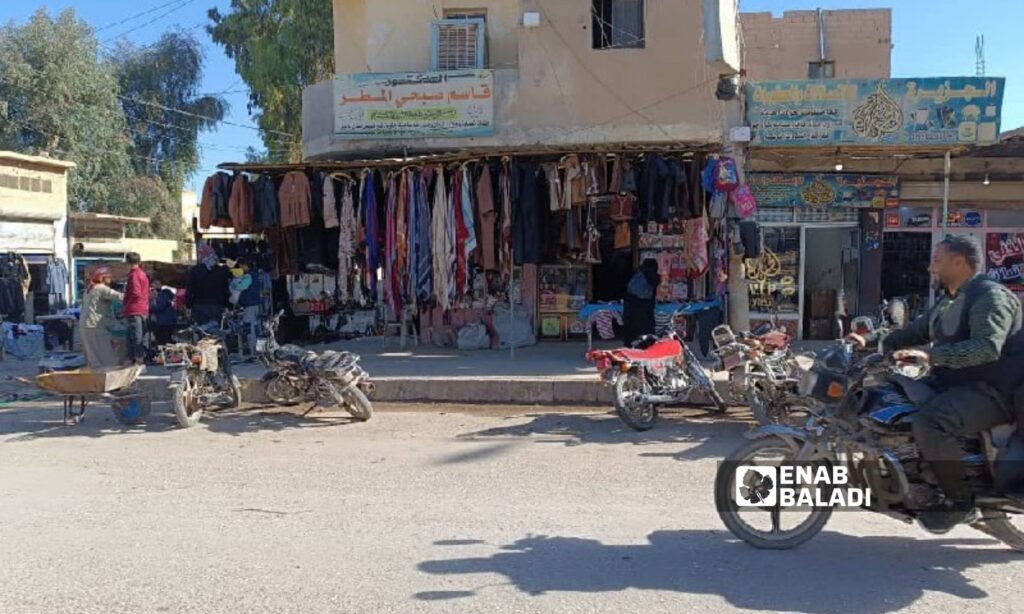Deir Ezzor – Obadah al-Sheikh
The imposition of annual taxes on merchants, pharmacies, and drugstore warehouses by the Finance Committee affiliated with the Autonomous Administration of North and East Syria (AANES) has sparked discontent among merchants due to the high amounts imposed amid the current economic conditions in the region.
Many shop owners consider that the discretionary estimation by the Taxation Authority’s employees dominates the imposed tax assessments without considering the current commercial reality, economic deterioration, and the weakening purchasing power of citizens.
A tax equal to two months’ work
Saleh, the owner of a clothing store in the town of Sweidan, eastern Deir Ezzor, told Enab Baladi that the tax imposed on his shop located on a small street amounted to 325 US dollars.
Saleh also mentioned that the value of tax imposed on other clothes shops in the same area ranges between 200 and 250 dollars, confirming that discretionary estimations and personal details are the standard in these cases and that the tax imposed on him is equivalent to two months’ work for his shop.
On the other hand, Abdullah, who owns a sweets shop in the town of Sweidan, stated that a committee visited him and discussed imposing a tax on the shop, and when he refused to pay, the responsible employee informed him that a new committee would come later and impose double the tax due to his refusal.
The employee also told him that the reason for imposing the tax is to assist in obtaining official papers, such as the commercial register and municipal papers, even though Abdullah’s shop does not require them.
No services in exchange for taxes
Shop owners whom Enab Baladi spoke to talked about the declining service reality, as the Autonomous Administration does not provide any basic services such as cleaning or electricity for commercial shops.
The same applies to various aspects in the region, as services such as cleaning, road maintenance, sewage network expansion, and street lighting are virtually absent.
Several shop owners in the city of al-Busayrah also mentioned that they are preparing to receive a committee scheduled for the coming week to inform them of the imposed taxes.
The fluctuations in the exchange rates of the Syrian currency against the US dollar led to raising the prices of various goods in the Syrian markets, including the areas controlled by the Syrian Democratic Forces (SDF) east of the Euphrates River in Deir Ezzor.
Pressure to impose dominance
Samir, who works in distributing medicine in the eastern countryside of Deir Ezzor, told Enab Baladi that the Taxation Authority asked him to pay an annual tax estimated at about 650 US dollars without allowing him the opportunity to refuse or object.
He pointed out that paying this tax will increase the costs of medicines that were previously raised by the producing companies, leading to increasing their prices to compensate for the losses resulting from paying this tax.
For his part, Mohammed, a vegetable merchant, confirmed that the sales movement inside his shop is the worst in months due to the significant increase in prices and the weakening purchasing power of the locals at the present time.
The current conditions have led to a stagnation in sales movement in various commercial sectors and the failure to achieve tangible profits, according to Mohammed. Despite this difficult situation, the Taxation Authority imposes large amounts that do not correspond to the volume of sales, as this tax may reach about 400 US dollars.
Mohammed called for reducing the tax values or canceling them for small commercial activities, focusing on assisting them to continue in light of the weak buying and selling movement, as many face difficulties in continuing their work due to these difficult circumstances.
The exchange rate of the US dollar surpassed 14,000 Syrian pounds, according to the S-P Today website, which specializes in foreign currency exchange rates.
The residents of the northeastern region are living in deteriorating living conditions similar to the different areas of influence in Syrian geography, while the areas controlled by the SDF are considered the richest in Syria, as they include most of the oil wells, in addition to being described as the “reservoir of wheat,” due to its agricultural richness.
The residents of the region continue to protest to improve their living conditions and secure fuels, and past protests were held to secure bread and sugar in the markets of the region.
Enab Baladi resorted to using the witnesses’ first names only to ensure their safety.

